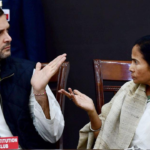In a recent turn of events, the Supreme Court has deferred the hearing of Umar Khalid’s bail plea concerning the Delhi riots larger conspiracy case. Umar Khalid, a former JNU scholar and activist, has been in custody since September 2020, facing trial under the Unlawful Activities (Prevention) Act for his alleged role in the communal violence that shook the national capital in February 2020.
The bench, consisting of Justices Bela Trivedi and Ujjal Bhuyan, listened to Khalid’s special leave petition challenging the Delhi High Court’s previous denial of bail. Khalid also submitted a writ petition under Article 32 of the Constitution, contesting various aspects of the anti-terror statute. The Supreme Court has consolidated Khalid’s plea with other petitions challenging the constitutionality of UAPA provisions.
The scheduled hearing on Wednesday had to be adjourned due to Justice Trivedi’s prior commitment to a different special bench at 2 PM. Senior Advocate CU Singh, representing Khalid, expressed readiness to argue but acknowledged the bench’s limited availability before lunch. The next hearing is now set for January 31, with Justice Trivedi stressing that the case would be given high priority.
Notably, the case faced a recusal earlier when Justice Prashant Kumar Mishra withdrew from hearing it in August last year. Since the notice was issued on May 18, the Supreme Court has witnessed multiple adjournments, including delays for the submission of counter-affidavit, Justice Mishra’s recusal, and various other reasons cited by both sides.
The proceedings have been characterized by meticulous scheduling adjustments, reflecting the complexities surrounding Umar Khalid’s case and the legal intricacies associated with the larger conspiracy linked to the Delhi riots.
Umar Khalid’s bail application journey has been marked by twists and turns, spanning several months, with this recent development pushing the resolution into the new year.

The Past Events
The journey began on October 18, 2022, when a division Bench of Justices Siddharth Mridul and Rajnish Bhatnagar in the Delhi High Court found prima facie evidence supporting the allegations against Khalid. Section 43D(5) of the UAPA was invoked, preventing bail if there is sufficient evidence indicating the commission of an offense under the statute.
Before the court could delve into Khalid’s application, it delayed proceedings, citing ongoing Supreme Court deliberations on the constitutionality of the sedition law. Khalid, however, was granted interim bail on December 12, 2022, lasting a week for his sister’s marriage, subject to strict conditions, including no contact with case witnesses and daily video calls to the investigating officer.
In contrast, three co-accused, Asif Iqbal Tanha, Devangana Kalita, and Natasha Narwal, secured bail in June 2021. The court, emphasizing the importance of distinguishing between the ‘right to protest’ and ‘terrorist activity,’ criticized the state’s approach in suppressing dissent.
Khalid’s appeal reached the Supreme Court on April 6, 2023, leading to a series of hearings. On May 18, a Bench comprising Justices A.S. Bopanna and Hima Kohli issued notice to the Delhi police, with the matter returnable in six weeks.
As the proceedings unfolded, delays persisted. On July 12, the Delhi police sought additional time to file counter-affidavits, a move contested by Khalid’s counsel Kapil Sibal. The court adjourned to July 24, stating that the bail application would take minimal time.
Subsequent hearings, including those on August 9 and September 5, faced setbacks due to various reasons, with the court giving the final opportunity for a hearing on September 12, 2023. The Bench comprising Justices Bose and Trivedi expressed intent to examine the bail application based on documentary evidence.
Despite multiple listings, the matter faced repeated adjournments, finally being scheduled for November 1, 2023. However, the wait extended further due to unforeseen circumstances, pushing the hearing to January 10, 2024, as requested by both Sibal and the Delhi police.
Amidst this legal odyssey, another petition by Khalid challenging the constitutionality of UAPA provisions surfaced on October 20, 2023. Tagged with the bail petition, it faced various twists, eventually being consolidated with other petitions related to Tripura violence on October 31, 2023. The court, despite calls for separation, opted to hear all petitions together.
On November 29, 2023, saw the bail matter listed for further hearing on January 24, 2024, based on a joint request from Sibal and the Delhi police. In the last development, the Supreme Court has deferred the hearing of Umar Khalid’s bail plea to January 31. As Umar Khalid awaits justice, the prolonged legal battle underscores the challenges in navigating the complex judicial landscape.









